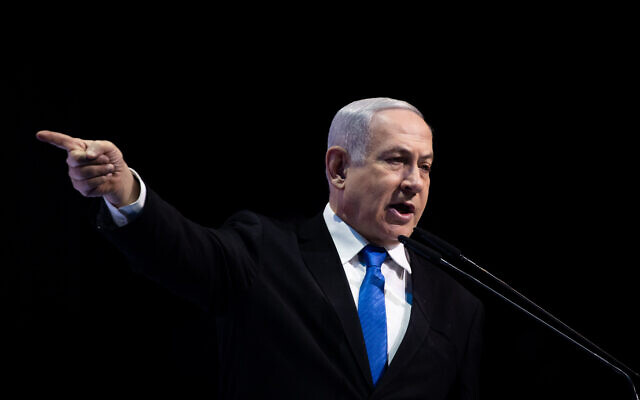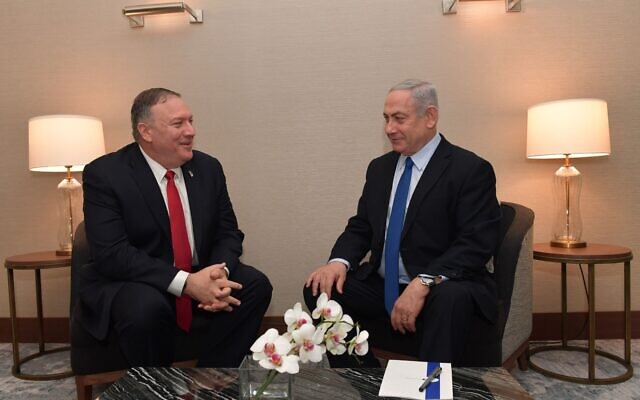Insisting he did raise annexing Jordan Valley with secretary, PM says it’s time to ‘regularize all communities in Judea and Samaria, those in the blocs and those outside them’

Prime Minister Benjamin Netanyahu at the conference of the Israeli newspaper Makor Rishon at the International Convention Center in Jerusalem, December 8, 2019. (Yonatan Sindel/Flash90)
Prime Minister Benjamin Netanyahu insisted on Sunday that he did discuss the possible annexation of the Jordan Valley and other parts of the West Bank with US Secretary of State Mike Pompeo during a meeting they held last week, despite a denial of the claim by the US State Department a day earlier.
“I want American recognition of our sovereignty in the Jordan Valley. This is important,” Netanyahu said at a conference organized by the Makor Rishon newspaper, saying that Israel has currently has a “great opportunity” to achieve it, along with securing an Israeli-US mutual defense pact.
“It is time to apply Israeli sovereignty in the Jordan Valley and to regularize all communities in Judea and Samaria, those in the blocs and those outside them. They will be part of the State of Israel,” he vowed, using a Biblical term for the West Bank in reference to the so-called settlement blocs that many believe will be retained in any peace agreement with the Palestinians.
Israel captured East Jerusalem and the West Bank, including the Jordan Valley, during the 1967 Six Day War. Palestinians want the territory for a future state, with East Jerusalem as the capital. Before 1967, the territory was held by Jordan, which didn’t annex it but also didn’t hand it over to the Palestinians.
“It was said that we had not discussed a formal plan and that was true, but the issue was raised and I raised it with Secretary of State Pompeo and I intend to raise the issue with the Trump administration,” the prime minister said.

The comments came after a senior US State Department official appeared to reject the claim made by Netanyahu last week.
“I can tell you that there was no annexation plan, full or partial, for any part of the West Bank presented by Israel to the United States during the meeting,” Assistant Secretary for Near Eastern Affairs David Schenker told reporters in an official State Department briefing on Saturday.
“And that has long been the US government position — that the ultimate disposition of territory is to be determined between the parties,” Schenker added, citing the traditional US support for Israeli-Palestinian negotiations.
Netanyahu, speaking on Thursday at the end of a two-day trip to Portugal where he and Pompeo met, explicitly said, as he did on Sunday, that the two discussed the possible annexation plan.
“We discussed the issue of annexation, but we’re not talking about timetables yet. These things are much easier when you have a government,” Netanyahu told reporters at his Lisbon hotel after he met with Portuguese Prime Minister Antonio Costa. Israel has had a transitional government since the April elections.
On November 18, Pompeo appeared to pave the way for an Israeli annexation of the Jordan Valley, and possibly other parts of the West Bank, when he declared that the administration would no longer consider Israeli settlements as necessarily illegal, repudiating a 1978 State Department legal opinion that held that they were “inconsistent with international law.”
Netanyahu in September vowed that if reelected he would immediately annex the Jordan Valley, a swath of land linking the West Bank to Jordan that Israel views as a vital security asset, in what was widely seen as a bid to attract support from right-wing voters.
In recent days, Netanyahu has repeatedly called for a unity government to be formed so that Israel could take the step, as well as advancing the mutual defense pact, citing a supportive US administration.
His Likud party has even claimed that the premier is determined to say in office for an additional six months — a unity coalition negotiation demand — solely in order to see through the annexation of the Jordan Valley and the defense pact with the US.
Days before Israel’s September 17 elections, Trump tweeted that he had spoken with Netanyahu on the phone about a potential pact and that he hoped to continue such talks after the vote. Trump tweeted that such a treaty “would further anchor the tremendous alliance between our two countries.”
Speaking on Sunday, Netanyahu addressed criticism of the idea of the mutual-defense pact proposal voiced by Blue and White leader Benny Gantz and other defense establishment officials.
“It’s possible now and we shouldn’t miss the opportunity,” Netanyahu said. “I told it to Benny Gantz. I told him I could bring this alliance in such a way that Israel’s freedom to act would not be restricted.”
Any potential defense pact is seen as highly controversial in the Israeli defense establishment, with officials concerned an accord on tighter defense cooperation could tie the hands of the Israeli military in certain undertakings, or at the very least limit its freedom to act independently.
Given the already robust US-Israel defense cooperation, formalizing it in a mutual defense treaty would bring little to no additional benefit, say many experts, including former top diplomats and defense officials. Instead, these critics warn, it may hamper Israel’s freedom to act militarily and would likely include an obligation to send troops on overseas missions to fight America’s wars.

Claiming to have forged numerous pacts and alliances, “some hidden from view,” that have advanced Israel’s interests, Netanyahu said, “The most important and irreplaceable alliance is the alliance with the United States, and it time time to formulate this alliance on the basis of a mutual defense pact for times of emergency, in which Israel fully maintains its freedom of action.
“I can achieve a historic defense alliance and that’s what I’m going to do, with God’s help, in the coming months.”
Referring to the ongoing lack of progress toward forming a unity government, with just four days remaining until elections are automatically called, Netanyahu blamed Blue and White for the deadlock, saying that if no breakthrough is reached, his rival party should “let the people decide” by agreeing to adopt direct elections for the prime minster.
“This is definitely a significant week in which we will find out whether Israel will go again to elections or whether common sense will prevail and finally the unity we so seek will be achieved,” Netanyahu said. “In the last few weeks, I have spared no effort. I have come a very long way, we made offer and offer and we got an answer — nada. Nothing. Blue and White didn’t move a millimeter, not even a nanometer, not anything.”
Nonetheless, the prime minister said, “It is not too late, there is still time to form a unity coalition” and prevent third elections within a year.

After neither Netanyahu nor Gantz secured a majority of seats together with their respective allies in the September election, both expressed their support for a unity government comprising their respective parties, but talks between them have failed to result in a coalition and they have traded blame for the deadlock.
Netanyahu, however, said that there was “one other way to prevent repeat elections,” reiterating a statement he released on Saturday backing the plan for direct elections just for prime minister.
“I put forward another proposal yesterday — exceptional situations need extraordinary solutions — I proposed to Benny Gantz to join a unity government and today I tell him to join a unity government with me, but if he is unable to make such a decision — let the people make the decision. Rapid elections for the direct election of the prime minister, to let the people decide who will be prime minister,” Netanyahu said. “This will save us many months of time, elections for the Knesset, and lots of money.”
The proposal, however, would likely face a formidable legal challenge from the High Court of Justice as it would entail sweeping reforms by a caretaker government during an election campaign.
While a direct election for prime minister would automatically determine who would form the government, it would not change the coalition arithmetic, and the winner would still need to form a coalition from the same parties elected in September.
Blue and White responded Saturday night to Netanyahu’s statement, saying, “We are engaged in preventing costly and unnecessary elections and not hollow spins to restore a system of elections that … failed miserably.”
The party said that the idea was a “hollow proposal that aimed at diverting fire from Netanyahu, accused in three serious corruption cases, who is the only person responsible for dragging the State of Israel for the third time” to a vote.
Raphael Ahren and Times of Israel staff contributed to this report.



Finally ending the Palestinian lie after 55 years (PLO covenant) and beginning to shine light on the Palestinian truth that Jordan is Arab Palestine while Israel is Jewish Palestine.